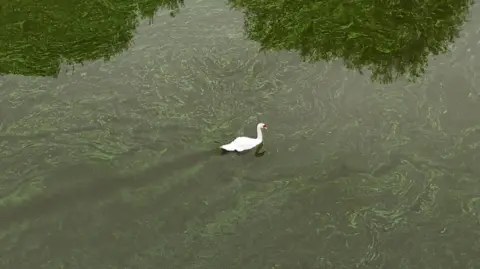Controversial water quality measures to be reviewed
 PA Media
PA MediaMore than 60 agri-food industry representatives have signed a letter, confirming they will take part in a group that will review controversial water quality measures.
They also say they will now respond to the current consultation on the Nutrients Action Programme (NAP) 2026-29 and encourage others to do so.
Farmers described the NAP as "out of touch" when it went out for consultation in May.
The initial consultation period was extended by four weeks and finishes on 24th July.
Last week, the Environment Minister Andrew Muir announced the formation of a stakeholder group that would review the consultation responses and formulate additional proposals ahead of a second consultation later this year.

In a letter to the minister, the groups - including the Ulster Farmers' Union, the NI Meat Exporters Association, the Ulster Arable Society and Irish dairy co-operative Tirlán - say they "cautiously welcome" the decision.
They added that "any developed policies must be genuinely workable at farm level", and that "policy must not place unfair regulatory burdens on the industry".
The formation of a stakeholder group as proposed by the minister is described as "a necessary step in correcting the deficiencies in the current consultation and in building a collaborative path forward".
They said the group will need "adequate time" and called for officials from the Departments for the Economy and for Infrastructure to be involved.
What is the Nutrient Action Programme (NAP)
A number of agri-food bodies had previously written to the minister, saying they were considering legal action if the consultation was not withdrawn.
The NAP was first introduced in 2007 and is updated every four years.
It initially led to improvements in water quality across Northern Ireland.
But since 2012, those gains have largely been offset by the intensification of agriculture following the introduction of the Going for Growth strategy.
The consultation document says there has been a marked increase in phosphorus in soil and that 18 out of the 21 monitored lakes in Northern Ireland are classed as moderate, poor or bad trophic status due to the amount of nutrients and algae present.
Pollution from agricultural sources is the main contributor to blue-green algal blooms in Lough Neagh.
Wastewater, industrial and septic tank pollution play a lesser role.
